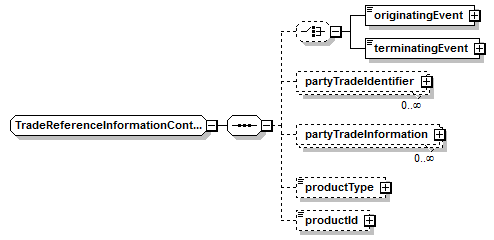
Namespace: |
|
Content: |
6 elements |
Defined: |
globally in fpml-business-events-5-5.xsd; see XML source |
Includes: |
definitions of 6 elements |
Used: |
never |

Complex Content Model |
| (originatingEvent | terminatingEvent)?, partyTradeIdentifier*, partyTradeInformation*, productType?, productId? |
| <xsd:group name="TradeReferenceInformationContents.model"> <xsd:sequence> <xsd:choice minOccurs="0"> </xsd:choice> <xsd:element maxOccurs="unbounded" minOccurs="0" name="partyTradeIdentifier" type="PartyTradeIdentifier"/> <xsd:element maxOccurs="unbounded" minOccurs="0" name="partyTradeInformation" type="PartyTradeInformation"/> </xsd:sequence> </xsd:group> |
Type: |
OriginatingEvent, simple content |
| xsd:normalizedString |
maxLength: |
255 |
| <xsd:element name="originatingEvent" type="OriginatingEvent"/> |
Type: |
PartyTradeIdentifier, complex content |
| <xsd:element maxOccurs="unbounded" minOccurs="0" name="partyTradeIdentifier" type="PartyTradeIdentifier"/> |
Type: |
PartyTradeInformation, complex content |
| <xsd:element maxOccurs="unbounded" minOccurs="0" name="partyTradeInformation" type="PartyTradeInformation"/> |
Type: |
ProductId, simple content |
| xsd:normalizedString |
maxLength: |
255 |
Type: |
ProductType, simple content |
| xsd:normalizedString |
maxLength: |
255 |
| <xsd:element minOccurs="0" name="productType" type="ProductType"/> |
Type: |
TerminatingEvent, simple content |
| xsd:normalizedString |
maxLength: |
255 |
| <xsd:element name="terminatingEvent" type="TerminatingEvent"/> |
| XML schema documentation generated with DocFlex/XML 1.8.6b2 using DocFlex/XML XSDDoc 2.5.1 template set. All content model diagrams generated by Altova XMLSpy via DocFlex/XML XMLSpy Integration. |